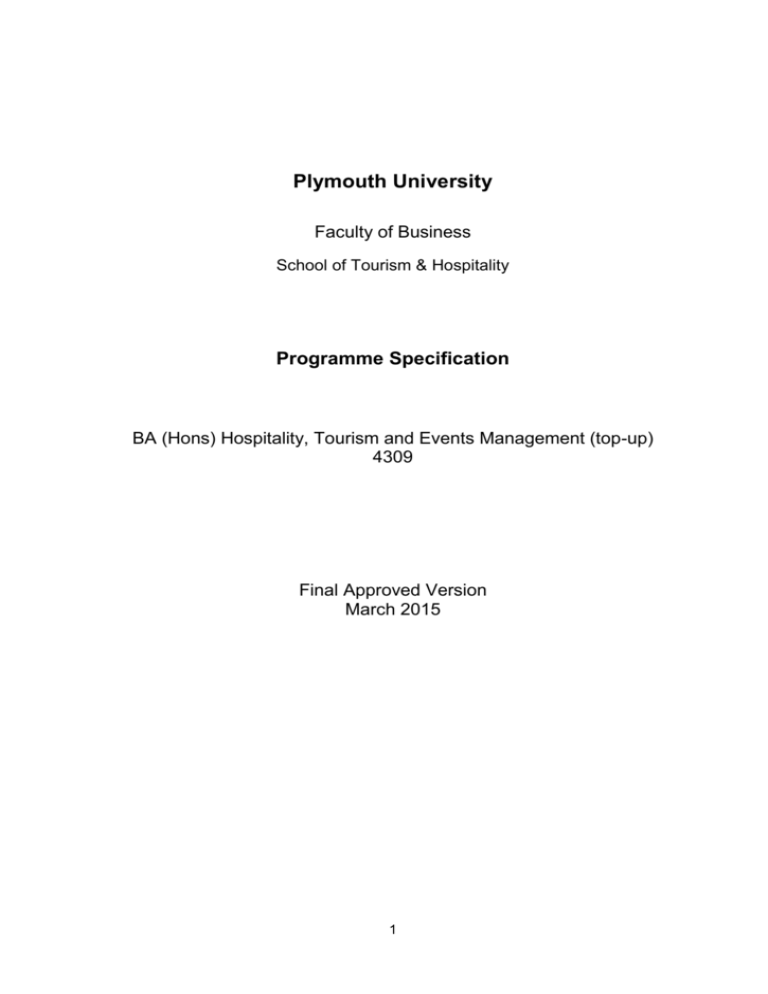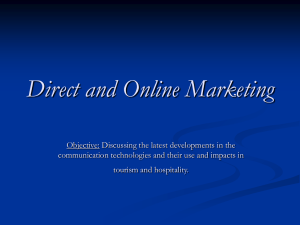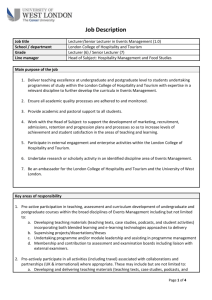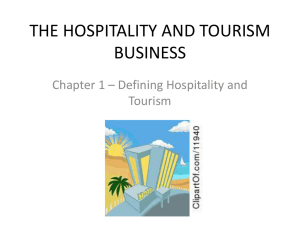BA Hospitality Tourism and Events Management 4309
advertisement

Plymouth University Faculty of Business School of Tourism & Hospitality Programme Specification BA (Hons) Hospitality, Tourism and Events Management (top-up) 4309 Final Approved Version March 2015 1 1. BA (Hons) Hospitality, Tourism and Events Management Final award title BA (Hons) Hospitality, Tourism and Events Management Level X Intermediate award title(s) Not applicable UCAS code NN2W JACS code N800 2. Awarding Institution: Teaching institution(s): Plymouth University Plymouth University 3. Accrediting body(ies) Institute of Hospitality Summary of specific conditions/regulations Date of re-accreditation 4. None August 2019 Distinctive Features of the Programme and the Student Experience This top-up degree is designed to produce graduates who have the theoretical underpinning, practical orientation and skill sets required for employment in the Tourism and Hospitality industry. The programme develops this by providing a methodical understanding of tourism enterprises through the provision of a mixture of taught modules and autonomous learning. Key to this process is the development of a broad understanding of the complex, diverse and holistic nature of business activity in the tourism, hospitality and events sectors. Unlike the current suite of BSc programmes offered in the School of Tourism and Hospitality, the programme is designed as a customised top up undergraduate degree for the combined career areas in hospitality and tourism. Providing high calibre graduates who are appropriately prepared for a career in tourism sectors, the BA (Hons) Hospitality, Tourism and Events Management top up degree programme includes a diversity of disciplines that contribute to supporting a meticulous understanding of the concepts and characteristics of the tourism and hospitality trade. The skillset embedded in the programme seeks to enhance candidates’ personal development by improved self-awareness, and continuous development of the requisite business and study skills. There are significant opportunities for vocational experience via Work Based Learning, Business simulation and Problem Based Learning. 2 5. Relevant QAA Subject Benchmark Group(s) Students will have a comprehensive knowledge of the industry (in line with the national benchmark for hospitality, contained within the ‘hospitality, leisure, sport and tourism’ benchmark) with areas of specialisation, determined by choice of project work. See the Threshold Benchmark statement (Appendix 1) and the Subject Benchmark and Module Skills Map (Appendix 2) More information can be seen on Subject Benchmarks at this website: http://www.qaa.ac.uk/Publications/InformationAndGuidance/Documents/HLS T08.pdf 6. Programme Structure Semester 1 HTM331/ Researching Hospitality Tourism and Events HTM333/ Hospitality Dynamics HTM329/ Leadership OR HTM310/ Crisis and Disaster Management in the Hospitality, Tourism & Events Industry 7. Semester 2 HTM331/ Researching Hospitality Tourism and Events HTM337/ Entrepreneurship HTM327/ Current Events Issues Programme Aims To develop a broad understanding of the complex, diverse and integrated nature of business activity in the tourism industry To foster awareness of the various dynamic contextual factors that will influence domestic and international tourism trade. To promote in-depth knowledge and understanding of the functional disciplines associated with international tourism business and identify their contribution to strategic decisions. To enhance employability through a combination of academic analysis, the development of key skills combined with work based learning, business simulation and problems based learning To provide students with pastoral support, to assist their personal development and adaptation to higher education. 8. Programme Intended Learning Outcomes 8.1. Knowledge and understanding On successful completion graduates should have developed: 1 1) Demonstrate in-depth knowledge in current issues pertinent to the hospitality industry 2) Demonstrate understanding in basic techniques of quantitative and qualitative analysis 3) Understand and analyse the dynamics and determinants for current issues in the hospitality sector 8.2. Cognitive and intellectual skills On successful completion graduates should have developed: 1) Critique of concepts, frameworks and theories 2) Abstract analysis and synthesis 3) Intelligent application of appropriate principles in assessing policy and practice 8.3. Key and transferable skills On successful completion graduates should have developed the ability to: 1) Literary and Information processing 2) Self management 3) Communication (Oral Written CIT) 8.4. Employment related skills On successful completion graduates should have developed: 1) Problem solving and research methods 2) Understand a variety of common responses to gather relevant information 3) Learning skills (reflection/evaluation synthesis) 8.5. Practical skills On successful completion graduates should have developed: 1) Presentation and oral communication skills 2) Written Communication skills 3) Computer and Information Management Technology Skills 2 9. Admissions Criteria, including APCL, APEL and DAS arrangements All applicants must have GCSE (or equivalent) Maths and English at Grade C or above. Entry Requirements for BA (Hons) Hospitality, Tourism and Events Management Foundation Degrees from partner colleges Relevant degree programmes including but not exclusive to Tourism, Hospitality or Events Management SQA HND/ HND (Level 5) Relevant degree programmes including but not exclusive to Tourism, Hospitality or Events Management 10. Progression criteria for Final and Intermediate Awards As per University Regulations 11. Exceptions to Regulations None. 12. Transitional Arrangements NA 13. Mapping and Appendices: 13.1. ILO’s against Modules Mapping See appendices 1 and 2 13.2. Assessment against Modules Mapping Each module descriptor contains details about the weighting of assessment, and more detail regarding assessments is provided in the module outline issued at the start of each module. The mix of assessment includes the traditional ones of unseen exams, set essays and reports. In addition, students will also be assessed through group presentations. Coursework assignment briefs are issued, giving directions and guidelines for the work to be completed successfully. At level 6, assignments will require more in the way of analytical/problem solving abilities; substantial research including primary research is expected for written assignments; reflection on the student's own development is also an aspect of assessed work. Case studies involving real life or hypothetical situations are also an important aspect of level 6. 13.3. Skills against Modules Mapping See appendices 1 and 2 3 13.4. Appendices Appendix 1: Threshold benchmark statement Code A B C D E F G H I J K L M N O Demonstrate an understanding of the development of knowledge in their particular subject domain Work with a multi-disciplinary and inter-disciplinary approach to study, drawing, as appropriate, from service, research and professional contexts Understand and develop their knowledge through academic and professional practice Demonstrate their research and problem solving abilities through acquisition, interpretation and analysis of information appropriate to the context of study with some limitations Understand and have some critical awareness of, the moral, ethical and legal issues which underpin best practice Plan, design and execute practical activities using appropriate techniques and procedures Undertake fieldwork with due regard for safety and risk assessment Plan, design, execute and communicate a sustained piece of independent work using appropriate media to communicate the findings Recognise those moral, ethical and safety issues which directly pertain to the context of study and be aware of relevant legislation and professional codes of conduct Research and assess subject specific facts, theories, paradigms, principles and concepts Assess and evaluate evidence Interpret data and text Describe and analyse information and be able to develop a basic reinterpretation of key factors Develop a reasoned argument and identify basic assumptions Take responsibility for their own learning and continuing professional development 4 Appendix 2: Generic skills assessed in each core module and subject benchmarking map QAA Benchmarks ABC ABC ABC ABC ABC ABC Knowledge & Understanding Level 6 Hospitality Dynamics Current Events Issues Crisis and Disaster Management (option) Entrepreneurship Tourism & Hosp Leadership (option) Researching Hospitality and Tourism A Cognitive / Intellectual Skills B C D E Key Transferable Skills F G H Practical Skills I K X X X X X X X X X X X X X X X X X X X X X X X X X X X X X X X X X X X X X X X X J X X L X X M N O X X X X X X X X KEY QAA Benchmarks A) Be able to describe, synthesise, interpret, analyse and evaluate information and data relevant to a professional or vocational context B) Be able to critically interpret data of different kinds and appraise the strengths and weaknesses of approaches adopted C) Be able to plan, design, manage and execute practical activities using appropriate techniques and procedures whilst demonstrating high levels of relevant skills 1 1







